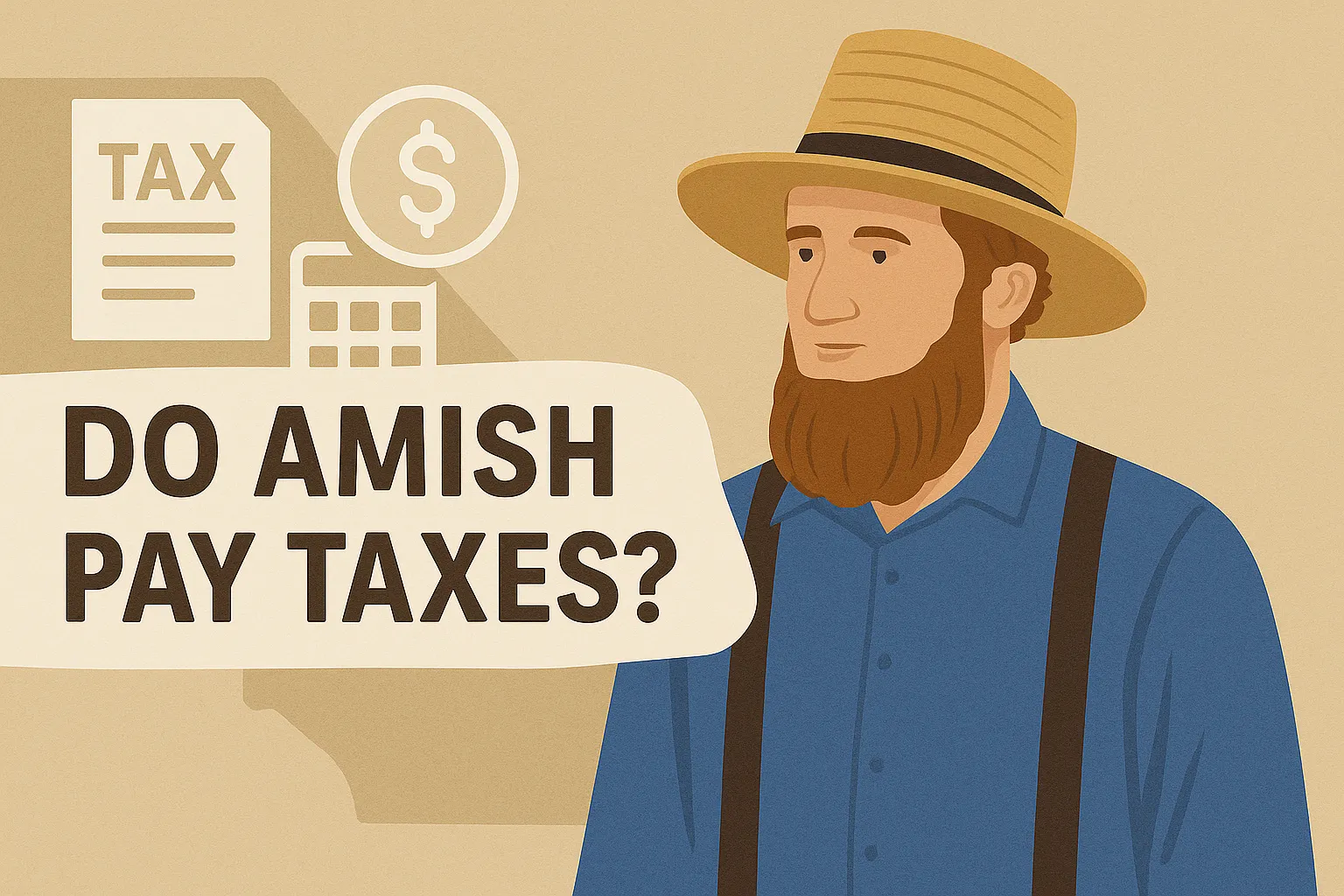Many people assume that the Amish, due to their isolated and traditional lifestyle, are exempt from paying taxes. However, this assumption is not entirely accurate. While the Amish do maintain a distinct way of life, separate from modern society, they still respect and abide by tax laws that apply to their communities.

The question remains: do Amish pay taxes like everyone else? The short answer is yes, but the long answer is more complex. The Amish pay various types of taxes, including sales, income, and property taxes, while maintaining their commitment to a simple, faith-based lifestyle.
In this article, we’ll explore the nuanced relationship between Amish communities and government taxation systems, and clarify how the Amish balance their religious convictions with civic responsibilities.
Key Takeaways
- The Amish pay various types of taxes, including sales, income, and property taxes.
- Amish communities respect and abide by tax laws that apply to them.
- The Amish maintain a distinct way of life while fulfilling their tax obligations.
- Understanding Amish tax obligations matters in the broader context of religious freedoms and tax exemptions.
- The relationship between Amish communities and government taxation systems is complex and nuanced.
The Amish Lifestyle and Tax Obligations
To comprehend the Amish approach to taxes, it’s essential to first understand who the Amish are and their core beliefs. The Amish are a traditionalist Christian group known for their simple living, plain dress, and reluctance to adopt modern technology. They originated in Switzerland in the late 17th century and have since established communities in various parts of the world, notably in the United States.
Who Are the Amish?
The Amish are characterized by their commitment to a simple, agrarian way of life, separate from the influences of modern society. They prioritize community and religious values over personal ambition and material wealth. Their communities are typically tight-knit, with members relying on each other for support and mutual aid. The Amish are also known for their pacifism, refusing to participate in military service or engage in violence.
Common Misconceptions About Amish and Taxes
A common misconception is that the Amish do not pay taxes due to their separation from mainstream society. However, this is not entirely accurate. While it’s true that the Amish maintain a distance from certain government entities and practices, such as not standing for the national anthem or saluting the flag, they are law-abiding citizens who understand the importance of taxation. Many Amish communities take pride in fulfilling their tax obligations, recognizing that taxes fund essential public services that benefit their communities.
For more detailed information on the Amish and their tax practices, you can visit https://amishrules.com/do-the-amish-pay-taxes/. The Amish distinguish between taxes that support military efforts, which conflict with their pacifist beliefs, and those that fund community services, which they generally support. It’s an important note that while the Amish may seek exemptions from certain tax obligations that contradict their religious principles, they are not exempt from all taxes.
Do Amish Pay Taxes? Yes, But With Some Exceptions
The Amish community’s tax obligations are often misunderstood, but the truth is that they do pay taxes, albeit with some exceptions. The extent of their tax payments varies depending on the type of tax and their level of interaction with the external economy.
Income Taxes
The Amish are required to pay federal income taxes just like other American citizens. However, their simple living and self-sufficient lifestyle often result in lower incomes, which can lead to lower tax liabilities. Similarly, the Amish do, in fact, pay state income taxes (if the state has them), just like other residents in the states where they live. Some Amish individuals may also be exempt from paying certain taxes due to their religious beliefs or because they don’t have a Social Security number and therefore do not participate in some federal programs. You should understand that while the Amish do pay income taxes, their unique circumstances can affect their tax obligations.
Property Taxes
Amish communities typically own land and property, which are subject to property and local taxes. These taxes help fund local services such as road maintenance, schools, and law enforcement. The Amish pay property taxes on their farms, homes, and other real estate holdings. In some cases, the Amish may benefit from lower property tax rates due to their agricultural activities or because they live in areas with lower tax rates. I’ll highlight how property taxes contribute to the local governments, public schools, and community development.

Sales Taxes
Sales taxes apply to any items purchased outside the Amish community. While the Amish thrive on self-sufficiency and produce many of their own goods, they still need to buy certain items from outside their communities. When they make these purchases, they pay sales taxes just like other consumers. Many Amish don’t pay much in sales taxes due to their self-sufficient nature, but when they buy goods from non-Amish businesses, sales taxes apply. You’ll learn about the self-sufficient nature of Amish communities that naturally reduces their sales tax burden through producing many of their own goods.
Amish businesses also collect and remit sales taxes when selling to non-Amish customers, demonstrating their compliance with tax laws. For instance, when Amish craftsmen sell their furniture, quilts, or other handcrafted items to tourists or other outsiders, they must collect sales taxes on those transactions. This not only helps the Amish businesses comply with tax regulations but also contributes to the local government’s revenue.
Tax Exemptions for the Amish Community
The Amish community enjoys several tax exemptions due to their unique lifestyle and religious beliefs. These exemptions are not special privileges but rather a recognition of their commitment to a simple, self-sufficient way of life. The exemptions help the Amish maintain their distinct cultural identity while being law-abiding citizens.
Social Security and Medicare Exemptions
One significant tax exemption for the Amish community is related to Social Security and Medicare. The Amish are exempt from paying into these systems due to their religious beliefs about self-sufficiency and community support. This exemption is crucial as it allows the Amish to maintain their traditional practices of caring for their elderly and disabled within their communities, rather than relying on government programs for financial help in times of need.
The exemption is formalized through a special status granted to self-employed individuals who are members of a recognized religious sect, such as the Amish. To qualify, members must waive their rights to Social Security benefits, which aligns with the Amish approach to community support rather than government assistance.

Other Tax Exemptions
Beyond the exemption for Social Security and Medicare taxes, the Amish community benefits from other tax exemptions that reflect their lifestyle. For instance, the gas tax is one that doesn’t significantly affect many Amish communities, primarily because they don’t use many machines or vehicles that rely on gasoline. Their key form of transportation is the horse-drawn buggy, and while some businesses may need machinery, they often use more dated technology or find alternative methods.
Additionally, the Amish rarely pay what is known as the “sin tax,” which applies to items considered morally hazardous, such as liquor, cigarettes, and gambling. The Amish prohibit these goods and services within their communities due to religious beliefs, naturally avoiding these taxes. Some Amish businesses may also qualify for agricultural exemptions related to farming operations, further reducing their tax burden.
These exemptions not only reflect the Amish commitment to their religious beliefs but also their approach to technology and consumption, which naturally results in lower tax burdens in certain categories. The Federal Unemployment Tax Act (FUTA) exemption is another significant exemption for many Amish employers, based on their religious beliefs about community support and self-sufficiency.
Conclusion
The Amish community’s unique approach to taxation offers valuable insights into their commitment to civic responsibilities while maintaining their distinct way of life. As we’ve explored, the Amish do pay taxes, but with certain exemptions based on their religious beliefs.
Their tax obligations include income taxes, property taxes, and sales taxes, demonstrating a significant commitment to contributing to the local economies and tax bases. However, they also have specific exemptions, such as Social Security and Medicare exemptions, reflecting their self-sufficient community practices.
Understanding the Amish tax status is crucial as it exemplifies the protections of religious freedom in American tax law. The Amish approach to taxation reflects their broader values of community self-sufficiency, mutual aid, and limited government dependence. By balancing their religious convictions with civic obligations, the Amish demonstrate a complex yet principled relationship with taxation.
In conclusion, the Amish example illustrates the ongoing negotiation between religious freedom and governmental authority in American life. As we reflect on their tax practices, we gain clarity on how communities can maintain their distinctive way of life while still being good citizens and contributing to the society.
FAQ
Are the Amish required to pay income taxes?
Yes, the Amish are required to pay income taxes, but they may be exempt from paying Social Security taxes due to their religious beliefs.
Do the Amish pay property taxes on their land and homes?
Yes, the Amish typically pay property taxes on their land and homes, just like other property owners in their communities.
Are the Amish exempt from paying sales taxes on goods and services?
No, the Amish are not exempt from paying sales taxes on goods and services, although some states may offer exemptions on certain items, such as food or clothing.
Can the Amish claim tax exemptions on their religious grounds?
Yes, the Amish can claim exemptions on certain taxes, such as Social Security taxes, if they can demonstrate that their religious beliefs prohibit them from participating in the Social Security system.
How do the Amish pay their taxes if they don’t use modern banking services?
The Amish typically pay their taxes in cash or by other means, such as money orders, since they often don’t use modern banking services.
Are there any special tax considerations for Amish businesses?
Yes, Amish businesses may be eligible for certain tax exemptions or deductions, such as those related to agricultural or charitable activities.
Disclaimer: This post is for educational purposes only and is not financial, legal, or tax advice. Do your own research or consult a qualified professional before making any decisions.
Affiliate Disclosure: GetJoeMoneyRight.com is a participant in the Amazon Services LLC Associates Program, an affiliate advertising program designed to provide a means for sites to earn advertising fees by advertising and linking to Amazon.com and affiliated sites.

